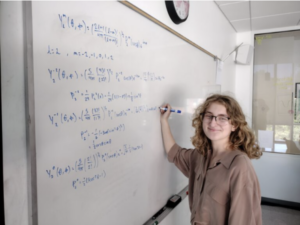
UMW junior Abigail “Abby” Swanson, a physics and math major, is the first female Mary Washington student to win the ultra-prestigious Goldwater Scholarship.
In our everyday language, symmetry refers to things that are rightly balanced. For Abigail “Abby” Swanson, a University of Mary Washington junior, majoring in physics and mathematics, the combination of the two subjects she studies couldn’t be “more balanced.”
Except, Swanson, who hails from Farmville, Virginia, studies the breaking of symmetry in fundamental theories with Assistant Professor of Physics Desmond Villalba. This research pertains to the early particle universe before any atoms were formed. Swanson uses mathematical representation to study how familiar particles obtain mass, and now her research has received national recognition, earning the most prestigious undergraduate award in STEM, the Barry Goldwater Scholarship.
Only 413 students are named among the 2023 Goldwater Scholars from more than 5,000 nominated by hundreds of academic institutions in the United States, according to the Barry Goldwater Scholarship & Excellence in Education Foundation. Each scholarship provides up to $7,500 per year for as many as two years of undergraduate study.
“I hope that as I’m working toward answering questions about fundamental particles and forces through my research, I’ll be able to also widen my sphere of influence to make systematic change,” Swanson said.
Her work with Villalba delves into the mysteries of particle physics: “Such as what is dark matter, is there a deep link between the four fundamental forces of nature, and why are neutrinos so weird?” he said. “We hope to glean more information about these unanswered questions by looking at symmetry breaking from a different mathematical perspective. I’m excited to see where our research goes.” Read more.